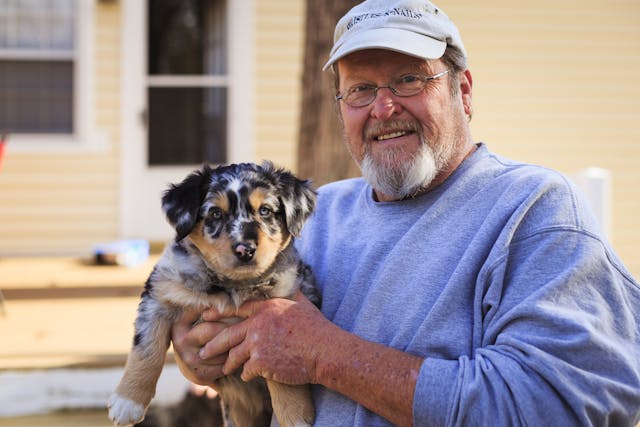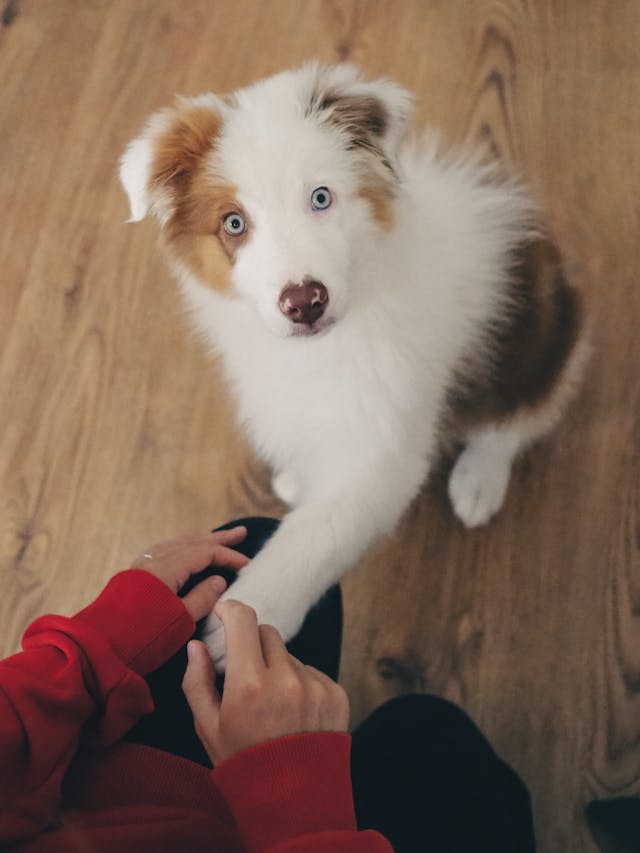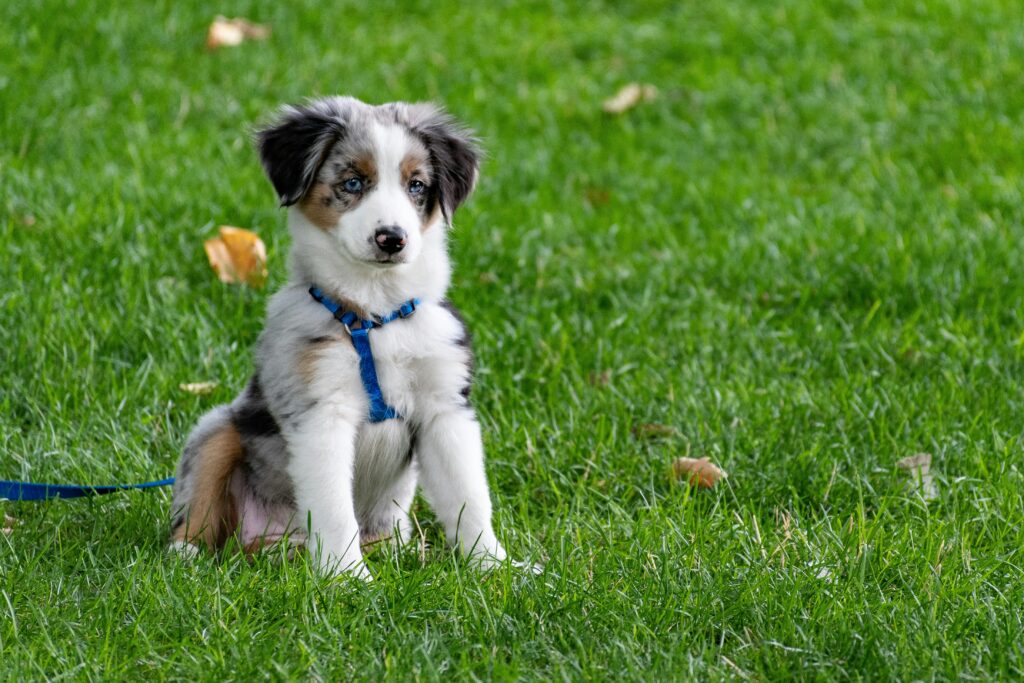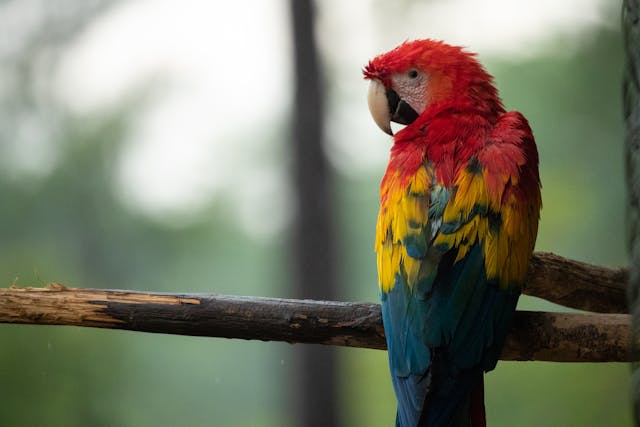Suppose you’ve decided to welcome an Australian Shepherd puppy into your life; congratulations! These energetic, intelligent, and loyal companions make fantastic family pets. However, raising an Aussie puppy comes with its challenges. This guide covers everything from understanding their history, temperament, and training needs to ensuring you provide the best care possible.
Table of Contents
The Origins of the Australian Shepherd
Despite their name, Australian Shepherds are not from Australia. The breed originated in the United States during the 19th century. Ranchers in the western U.S. developed the breed from various herding dogs to meet their unique working needs. Known for their incredible stamina and intelligence, Australian Shepherds quickly gained popularity as working dogs, excelling in cattle and sheep herding.
Understanding the breed’s historical purpose is essential for new owners. Aussies were bred to work long hours, which translates into their energy levels today. It’s critical to keep this in mind as you prepare to raise an Aussie puppy.
Australian Shepherd Puppy Characteristics
Australian Shepherd puppies are known for their striking appearance and energetic personality. They usually have medium-length coats that come in a variety of colors, including blue merle, red merle, black, and red. Many have distinctive markings on their faces, as well as bright blue or heterochromatic (different-colored) eyes.
Aussies are known for their intelligence, often among the most intelligent dog breeds. This makes them easy to train but also requires significant mental stimulation. An under-stimulated Aussie puppy may develop behavioral problems, so keeping them busy is essential.
Temperament and Personality Traits
Aussies are loyal, affectionate, and highly energetic. These dogs tend to form strong bonds with their owners and families, often becoming quite protective. Australian Shepherd puppies are known for their curiosity and eagerness to explore their environment, which can sometimes translate into mischief if not adequately supervised.
Additionally, Australian Shepherds are natural herders. While this instinct makes them excellent farm dogs, it can sometimes lead to issues in household settings, particularly with small children. Aussies may attempt to “herd” their family members or other pets by nipping at their heels. Early training and socialization can help curb this behavior.
Preparing Your Home for an Australian Shepherd Puppy
Before bringing your Australian Shepherd puppy home, it’s essential to prepare your space. Here are a few things to consider:
- Puppy-proof your home: Remove hazards like exposed wires, chemicals, or sharp objects.
- Create a dedicated space: Set up a comfortable area with bedding, toys, and food bowls. Aussies appreciate having their own space to relax.
- Suitable toys: Australian Shepherd puppies need toys that provide mental and physical stimulation. Puzzle toys and chew toys are great options.
Because these dogs have so much energy, it’s crucial to have space where they can run and play. A fenced yard or nearby park is ideal for daily exercise.
Feeding an Australian Shepherd Puppy
Proper nutrition ensures your Australian Shepherd puppy grows healthy and strong. High-quality dog food formulated for puppies is essential, as it will provide the right balance of nutrients. Here’s what you should keep in mind:
- Puppy-specific food: Choose food specifically formulated for puppies, as they have different dietary needs than adult dogs.
- Protein-rich diet: Aussies are active dogs and need plenty of protein to support their muscle development.
- Portion control: Overfeeding your puppy can lead to obesity, which can cause joint issues later in life. Follow the feeding recommendations on the dog food packaging and consult your vet if you have concerns.

Training Your Australian Shepherd Puppy
Training an Australian Shepherd puppy is both a rewarding and challenging experience. Due to their intelligence and eagerness to learn, Aussies are generally easy to train. However, their high energy levels can distract them quickly, so patience is vital.
Here are some training tips:
- Start early: Begin basic obedience training when you bring your puppy home. Commands like “sit,” “stay,” and “come” are essential.
- Positive reinforcement: Aussies respond best to positive reinforcement, such as treats and praise. Avoid harsh punishments, as these can lead to fear or anxiety.
- Consistency: Be consistent in your commands and expectations. Training sessions should be short, frequent, and fun.
Socialization
In addition to basic training, it’s crucial to socialize your Australian Shepherd puppy early. Expose them to various environments, people, and other animals to help them become well-rounded, confident dogs. Socialization helps reduce the likelihood of behavioral problems such as aggression or excessive shyness.
Exercise Needs
Australian Shepherds are incredibly active dogs, and puppies are no exception. Your Aussie puppy will need daily exercise to burn off energy and stay healthy. Without sufficient physical activity, they can become bored and destructive.
- Daily walks: Aim for at least two 30-minute walks per day.
- Playtime: Engage in games like fetch or tug-of-war to entertain your puppy.
- Mental stimulation: Puzzle toys, obedience training, and learning new tricks can help keep your Aussie’s sharp mind engaged.
As your puppy grows, you can gradually increase the intensity of their exercise. However, avoid high-impact activities like jumping or running on hard surfaces until their joints fully develop.
Grooming Your Australian Shepherd Puppy
While Aussies have a relatively low-maintenance coat, they require regular grooming to keep their fur in good condition. Their double coat can shed, particularly during seasonal changes.
- Brushing: Brush your puppy’s coat once or twice weekly to remove loose hair and prevent matting.
- Bathing: Only bathe your Aussie when necessary, as over-bathing can strip the natural oils from their skin.
- Nail trimming: Regularly trim your puppy’s nails to prevent overgrowth and discomfort.
Grooming sessions are also an excellent opportunity to check your puppy’s ears for signs of infection and keep their teeth clean.

Health Concerns in Australian Shepherd Puppies
Like all dog breeds, Australian Shepherds are prone to specific health conditions. While responsible breeders screen for these issues, it’s still important to be aware of them:
- Hip dysplasia: A common condition in many medium-to-large dog breeds, hip dysplasia can cause pain and arthritis.
- Progressive Retinal Atrophy (PRA): This genetic condition affects vision and can eventually lead to blindness.
- Epilepsy: Some Australian Shepherds may be prone to seizures.
Regular veterinary check-ups are essential for catching any potential health issues early. Ensure your puppy is up to date on vaccinations and parasite prevention.
Bonding with Your Australian Shepherd Puppy
Building a strong bond with your Australian Shepherd puppy is crucial to developing a healthy and happy relationship. Aussies thrive on human interaction and will quickly become attached to their owners.
- Spend quality time together: Whether through training, play or simply relaxing together, ensure your puppy knows they are a valued part of the family.
- Be patient: Australian Shepherd puppies are brilliant but still puppies. They’ll make mistakes as they learn. Patience and positive reinforcement are essential to building trust.
- Training as bonding: Engaging in training sessions will not only help teach your puppy commands but also strengthen your bond.
Conclusion
Owning an Australian Shepherd puppy is an exciting and rewarding experience but requires careful planning, consistent training, and attention. These puppies grow into loyal, intelligent, and energetic dogs that thrive in active homes. By understanding their unique needs—from training and exercise to grooming and health care—you’ll ensure your Australian Shepherd grows into a well-adjusted, happy adult dog. With the proper preparation and a loving home, your Aussie puppy will become a cherished family member for years.



